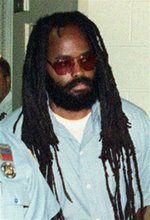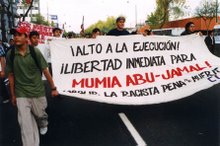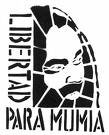HEREDAR UN IMPERIO
Mumia Abu-Jamal
20/12/08
Cuando Barack Hussein Obama tome el juramento al cargo de
Presidente de Estados Unidos, recibirá no sólo las riendas
de las oficinas ejecutivas del gobierno norteamericano, si
no también heredará el dominio de un imperio, uno por el
cual ningún norteamericano conscientemente votó.
Como si no fuera suficiente la más alta oficina política
de una nación con más de 300 millones de habitantes,
capitales alrededor del mundo son inmediatamente afectadas
por lo que pasa en Washington.
Hasta cierto punto, Estados Unidos heredó el papel
imperial con la decadencia del débil Imperio Británico
al terminar lo que se llama, la Segunda Guerra Mundial
(1939-1945). Fué el resultado lógico de las pérdidas de la
guerra, así como de las rebeliones de las colonias
británicas en Africa y Asia que luchaban por su independencia
nacional.
En muchos de los lugares de los que Gran Bretaña se retiró,
Estados Unidos avanzó.
Como la guerra generalmente se luchó fuera del territorio
continental norteamericano, Estados Unidos estuvo libre para
usar los recursos excedentes, y de ese modo surgir de las
cenizas de la guerra como el más fuerte y el más rico sobreviviente.
Hoy Estados Unidos libremente interfiere en los asuntos de
otras naciones, en todo el mundo. Mediante sus servicios de
inteligencia, su dominio del Banco Mundial y su poderío militar,
elimina a unos líderes y compra otros, seduce a sus críticos en
el extranjero y, usando los medios de comunicación como lo hizo en
Irak, desata a su capricho guerras injustas.
Parte de ésto es una forma de programa de administración global
que dice beneficia a Estados Unidos; parte es también el abuso de
su gran poder para conseguir los fines deseados, generalmente estos
fines son los del sector de las grandes corporaciones.
Esto ha llevado a líderes norteamericanos a hablar de democracia
mientras apoyan y mantienen una tira de dictadores de un lado del
mundo, al otro.
Este es el sistema que Obama va a heredar. Va a tratar de cambiarlo,
o lo va a hacer más fuerte?
El tiempo lo dirá.
Hace más de 2,000 años, un africano tomó el trono del Imperio
Romano. Gobernó por unos 18 años, y desató guerras en nombre de Roma.
Su nombre fué, Séptimo Severo, y había nacido en lo que es hoy,
Libya, en Africa del Norte. Y si su reino trajo riqueza, poder y honor
a su familia y a su provincia natal, él no cambió a Roma tanto como
Roma lo cambió a él.
Su poder lo llevó a extender el Imperio, pero no ha cambiarlo.
Su hijo, Caracalla, gobernó el Imperio después que él y dió la
ciudadanía romana a los liberados de las provincias, pero también
es recordado por un reinado de crueldad.
Lo que Roma nos enseñó es que para que nazca un imperio, una
república tiene que morir.
¿Qué forma tomará el siguiente cambio, cuando llegue?
--(c) '08 maj
******************************************************
INHERITING AN EMPIRE
[col. writ. 12/20/08] (c)
'08 Mumia Abu-Jamal
When Barack Hussein Obama takes the oath of office, he will receive
more than the reins to the executive office of the U.S. government; he will
inherit the rulership of empire, one that no American consciously voted for.
As if the highest political office in a nation of over 300 million
people wasn't enough, capitals all around the world are immediately impacted by
what happens in Washington.
In a sense, the U.S. inherited its imperial role after the weakening and
decline of the British Empire at the close of the so-called Second World War
(1941-194). This was the logical result of the losses of war, as well as the
rebellion of British colonies in Africa and Asia, which struggled for
national independence.
In many places where Britain withdrew, the U.S. advanced.
Because the war largely avoided American territory, the U.S. was free to
use its excess resources to emerge as the strongest and wealthiest survivor
of the ashes of war.
Now the U.S. freely interferes with nations across the globe. Through
its intelligence services, its domination of the World Bank, and the military,
it removes leaders, buys off other leaders, seduces critics abroad, and,
using the media as it did on Iraq, wages unjust wars at will.
Part of this is a kind of global management program that claims to
benefit America; part is also the abuse of great power to achieve desired ends,
often the ends desired by the corporate sector.
This has led leaders to speak of democracy while supporting a train of
dictators from one end of the earth to the other.
This is the system that Obama will inherit. Will he endeavor to change
it, or will he try to strengthen it?
Time will tell.
Over 2,000 years ago an African took the throne of the Roman Empire. He
ruled for some 18 years, and waged wars on behalf of Rome.
His name was Septimius Severus, and he was born in what is today Libya,
in North Africa. And while his reign brought wealth, power and status to his
family and his home province, he did not change Rome so much as Rome changed
him.
His power went to extend empire, not to change it.
His son, Caracalla, ruled the Empire after him and he extended Roman
citizenship to the provincial freemen, but he's also remembered for a reign of
cruelty.
What Rome taught us all is that for an empire to be born, a republic
must die.
When change next comes, what form will it take?
--(c) '08 maj
miércoles, 28 de enero de 2009
Suscribirse a:
Enviar comentarios (Atom)









No hay comentarios:
Publicar un comentario